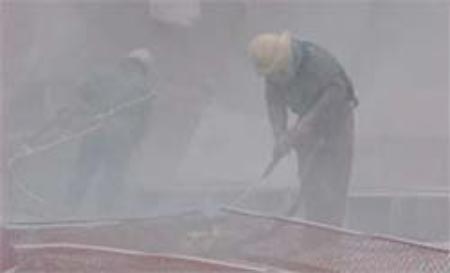Abrasive Blasting Safety

The following safety rules are recommended when abrasive blasting work is being performed:
-
Allow only authorized and properly trained personnel within the blasting area. Before blasting begins, the supervisor and/or other designated employees should inspect the area and the object(s) to be blasted to ensure proper conditions.
-
All blasting equipment must be inspected and properly assembled with all approved safety devices and gauges. All hose connections must be secured and nozzles checked before commencing. Due to serious health hazards, it is recommended that a blasting agent be used that does not contain silica.
-
Employees must wear the appropriate personal protective equipment including NIOSH approved respirators designed to protect employees form dusts produced during abrasive blasting operations, eye and face protection, hearing protection, foot protection, and gloves. When blasting on coated metal surfaces, be sure to evaluate the additional hazards associated with the particular coating.
-
If helpers, tenders, or other personnel are exposed to dust from the operation, they must also wear approved personal protective equipment. All personnel should avoid working downwind of the blasting operation.
-
Be sure to keep hoses from becoming entangled, cut, separated, or from pulling the operator off balance.
-
The operator must maintain a firm grip and be in complete control of the nozzle at all times. Never aim the nozzle in the direction of anyone. Keep hands away from the nozzle opening.
-
Blasting nozzles must be equipped with automatic cutoff valves or manual “dead man” control in the event the operator loses control of the hose. The manual control must never be tied or taped down.
-
Blasting equipment and surfaces to be blasted should be grounded to prevent static sparks, especially if volatile substances could be present. Hoses must be composed of a type to prevent shocks from static electricity. Hose couplings must be metal and secured to the outside of the hose to avoid erosion and weakening of the couplings.
Make safety a reality and don’t be a fatality!!
Download flyer: STOTW_423_AbrasiveBlastingSafety.pdf (171.43 kb)
Download Spanish flyer: STOTW_423_AbrasiveBlastingSafety_esp.pdf (171.45 kb)

